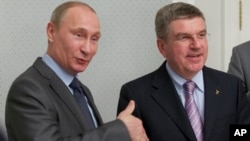The United Nations General Assembly has maintained its tradition of the past two decades, adopting a symbolic resolution for an international truce during the 2014 Olympics in Sochi, Russia.
It calls for an end to fighting around the world to begin one week before the Winter Games begin February 7, and to end seven days after the Paralympics conclude in Sochi on March 16.
Similar resolutions have had little impact on world conflicts during past Olympics. Syria co-sponsored this resolution Wednesday, but there appears to be little prospect that the civil war there will abate before the Sochi Games.
The United States drew attention to language it inserted for the first time in the truce resolution. The phrase called "upon host countries to promote social inclusion without discrimination of any kind."
Russia triggered angry criticism and even some calls to boycott the Sochi Games when it adopted an anti-gay law last June.
Sochi Games chief Dmitry Chernyshenko told reporters at the U.N. that during the Olympics they guarantee "there will be no discrimination whether by religious or sexual or gender."
International Olympic Committee president Thomas Bach said the IOC recognizes the world's diversity and hopes sporting boycotts are avoided. He added that the IOC never accuses or excludes anyone, that "boycotts are a fundamental contradiction to the spirit of sport."
It calls for an end to fighting around the world to begin one week before the Winter Games begin February 7, and to end seven days after the Paralympics conclude in Sochi on March 16.
Similar resolutions have had little impact on world conflicts during past Olympics. Syria co-sponsored this resolution Wednesday, but there appears to be little prospect that the civil war there will abate before the Sochi Games.
The United States drew attention to language it inserted for the first time in the truce resolution. The phrase called "upon host countries to promote social inclusion without discrimination of any kind."
Russia triggered angry criticism and even some calls to boycott the Sochi Games when it adopted an anti-gay law last June.
Sochi Games chief Dmitry Chernyshenko told reporters at the U.N. that during the Olympics they guarantee "there will be no discrimination whether by religious or sexual or gender."
International Olympic Committee president Thomas Bach said the IOC recognizes the world's diversity and hopes sporting boycotts are avoided. He added that the IOC never accuses or excludes anyone, that "boycotts are a fundamental contradiction to the spirit of sport."





